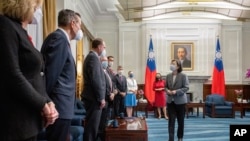A bipartisan U.S. congressional delegation led by Representative Stephanie Murphy, a Democrat from Florida, concluded a trip Taiwan on Friday, the latest in a string of high-profile trips by U.S. officials in recent weeks.
Murphy and her delegation, including Democratic House member Kai Kahele, and Republican House members Scott Franklin, Joe Wilson, Andy Barr, Darrell Issa, Claudia Tenney, and Kat Cammack, met with senior Taiwanese leaders, including President Tsai Ing-wen on Thursday, when both sides expressed commitment to deepening political and economic ties.
During the meeting, Tsai thanked the United States for demonstrating “rock-solid support for Taiwan” just over a month after China carried out large-scale military exercises in the Taiwan Strait to protest a visit by the speaker of the U.S. House of Representatives, Nancy Pelosi.
“I want to take this opportunity to tell our friends that Taiwan will not bow to pressure or coercion. We will defend our democratic institutions and way of life. Taiwan will not back down,” Tsai said, according to an official transcript of the meeting.
In her remarks, Murphy said Thursday Congress can deepen the economic relationship with Taiwan by pursuing what she called a “high-quality free-trade agreement” with Taipei. In June, the two sides launched the U.S.-Taiwan Initiative on 21st-Century Trade, aimed at deepening economic and trade relationships and advancing mutual trade priorities.
Murphy also urged the U.S. Congress to push for greater Taiwanese participation in international organizations as it has “shown itself to be a responsible member of the international community.”
Despite its status as one of Asia’s most successful democracies, Taiwan has gradually been pushed out of international bodies from the World Health Assembly – the decision-making body of the World Health Organization - to the International Civil Aviation Organization at the behest of China, which claims self-ruled Taiwan as a province.
Murphy, the vice chair of House Armed Services Committee Subcommittee on Intelligence and Special Operations, is also a notable supporter of the Taiwan Democracy Defense Lend-Lease Act, a bill introduced in July to expedite military aid to Taiwan.
Visits by U.S. delegations are widely seen as a show of support for Taipei and an important signal to China, which has long pledged to take control of Taiwan and its outlying islands in a conflict dating back to 1949.
“My sense is, people felt comforted. US congressional visits along with visits by other friends from various different countries assured them that China does not dominate Taiwan’s international engagement,” said Norah Huang, Director for International Studies and Associate Research Fellow, Prospect Foundation, a Taiwan-based research firm, said by email. “While obviously China has been portraying the picture that Taiwan can only thrive in the international stage with China’s permission. In the meantime, people does worry the risks and challenges imposed by China’s bellicose reaction.”
Recent trips have also been followed by major developments in Taiwan’s defense policy. In the weeks after Pelosi’s visit, Tsai announced that Taiwan would raise its defense budget nearly 14% year-on-year while U.S. President Joe Biden’s administration recently approved $1.1 billion in arms sales.
For decades, Beijing has called for unification by force or by peaceful means, but analysts worry an invasion or blockade could be in store in the coming years as China completes a massive modernization campaign to rejuvenate its military.
Some in Taiwan worry that in such a tense environment, U.S. visits could backfire and provoke Beijing rather than serve as a deterrent to further military action by signaling that Taiwan does not stand alone despite lacking formal diplomatic allies.
The “people of Taiwan welcome and appreciate the support from US congressional members; however, we are also concerned the escalation of aggression and conflict inflicted by China to retaliate, which may lead to security risks across the Taiwan Strait,” Jason Hsu, a senior research fellow at the Ash Center for Democratic Governance and Innovation at the Harvard Kennedy School, said in response to written questions.
Despite drawing Beijing’s ongoing ire, five groups of U.S. officials visited Taiwan in August including Pelosi. Other delegations were led by Democratic Senator Edward Markey, Republican Senator Marsha Blackburn Arizona Republican Governor Doug Ducey and Indiana Republican Governor Eric Holcomb.
Pelosi’s trip was met with widespread enthusiasm from Taiwanese and drew large crowds at the airport to watch her land, but other recent U.S. trips have drawn less attention.
Lev Nachman, a political scientist at National Chengchi University in Taiwan, said such a large number of trips in a short time may begin to have diminishing returns while taking up Taiwanese government resources.
“I don’t think people are lining up with the same enthusiasm they did with the Pelosi visit,” he told VOA. “I think the visits are certainly welcome but I don’t think they are grabbing as much attention domestically.”











